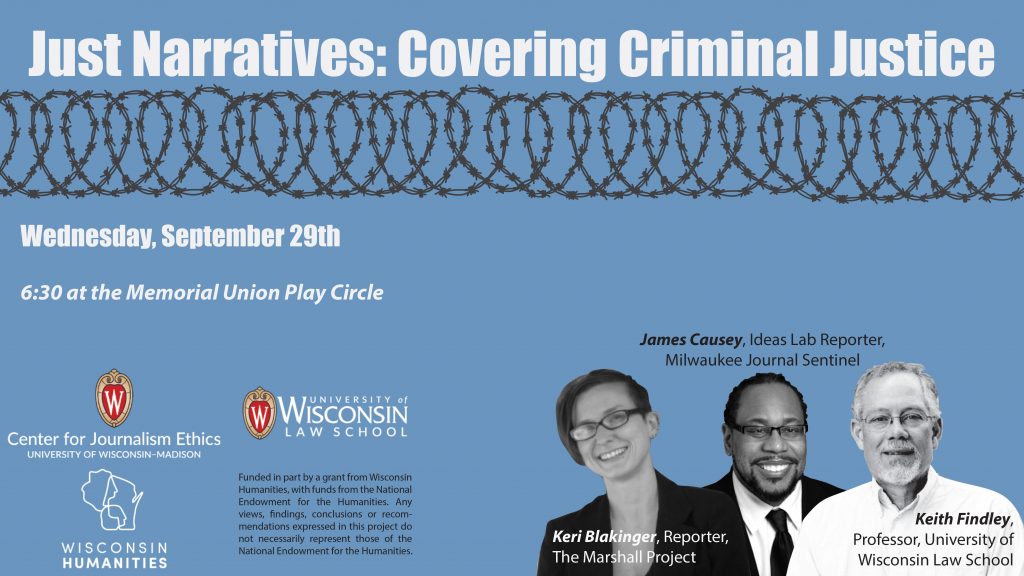
FOR IMMEDIATE RELEASE
Panel to discuss criminal justice reporting and journalism ethics
Madison, Wisconsin – The Center for Journalism Ethics will host a public event – “Just Narratives: Covering Criminal Justice” – at 6:30 p.m. Wednesday, Sept. 29, at the Memorial Union Play Circle on the UW–Madison campus. Three panelists with expertise in criminal justice and journalism will engage in a public discussion about media ethics and the challenges of covering the justice system in the U.S.
This free event is co-sponsored by the University of Wisconsin Law School and supported by the Wisconsin Humanities Council. To attend virtually, join us online here.
The panelists:
- Keri Blakinger is a Marshall Project investigative reporter and the 2021 Center for Journalism Ethics journalist-in-residence. Blakinger’s work on criminal justice has led to major changes in medical care in Texas prisons, spurred the creation of a book club in the Harris County jail and sparked the creation of a law better protecting families from the wrongful removal of children by welfare agencies.
- James Causey is an award-winning special projects reporter, editorial columnist and contributing editor for the Milwaukee Journal Sentinel. A former Nieman Fellow, he began his journalism career at the Sentinel at the age of 15 and has covered mental health, employment, housing and incarceration.
- Keith Findley is a UW–Madison professor of law and the co-founder of the Innocence Project. His areas of expertise include evidence, wrongful convictions, criminal law and procedure, forensic science and policing. He is past president of the Innocence Network and co-founder of the Center for Integrity in Forensic Science.
Kathleen Bartzen Culver, James E. Burgess Chair in Journalism Ethics and director of the Center, will moderate the conversation, which explore topics such as the role of media in reinforcing the status quo, ethical issues in covering a system and representing the people caught up in that system, and the role of “solutions journalism” in engaging the public in criminal justice issues.
“At a time when people across the country are asking tough questions about our justice systems, it’s critical that journalists do the same,” Culver said. “I’m proud the Center can bring together these expert voices to help us move news coverage of crime and justice forward.”
Blakinger will be visiting the Center for Journalism Ethics the week of Sept. 27 as part of the Center’s journalist in residence program, an initiative now in its sixth year. The program brings renowned journalists to campus to promote engagement with UW–Madison students and the public.
The Center for Journalism Ethics, housed in the School of Journalism and Mass Communication at the UW-Madison, provides an international hub for the examination of the role of professional and personal ethics in the pursuit of fair, accurate and principled journalism. Founded in 2008, the Center offers resources for journalists, educators, students and the public, including internationally recognized annual conferences exploring key issues in journalism.
The Wisconsin Humanities Council supports projects that strengthen the roots of community life through education and cultural programs that inspire civic participation and individual imagination. The mini-grant supporting this event comes in part from funding from the National Endowment for the Humanities (NEH). Any views, finding, conclusions or recommendations expressed in this project do not necessarily represent those of the National Endowment for the Humanities.
For information, contact Krista Eastman, Center for Journalism Ethics administrator, at krista.eastman@wisc.edu.
